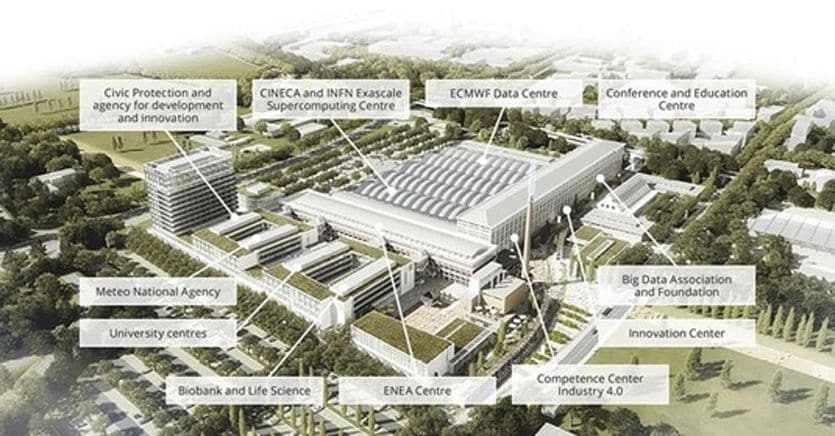An ecosystem that has already catalyzed over 800 million euros of national and European investments by concentrating the most powerful computing and research systems in the country, which is now a candidate to host the United Nations University and to build one of the six quantum computers of the first European network: this is today the “Big data technopole” in the former Manifattura Tabacchi in Bologna. An abandoned industrial area of 120 thousand square meters in the fair area, at the center of an impressive redevelopment work that since last September is also the home of the ICSC, the national center for supercomputing promoted by the INFN-National Institute of Nuclear Physics, one of the five Italian centers for frontier research, financed by the NRP with 320 million euros.
A seven-year journey
The flagship of the Big data technopole in Bologna are the supercomputer HPC Leonardo, one of the three best performing brains in the world, which will be inaugurated on November 24th, and the data center of the ECMWF-European Center for Weather Forecasts, which was switched on last October 18th after the move from England. But other Italian research centers are on the way (including the Enea one for the circular economy, the Cnr one for materials research, the Italia Meteo Agency, the INAF-National Institute of Astrophysics) which will bring 90% of the share of the country’s computing capacity condensed in the Emilian capital. “This incredible place is the result of a patient and intelligent thought started in 2015, shared and carried out with a team game between public and private that has allowed us to win projects without which our country would have lost the opportunity to be in front row in the world », underlines the councilor for economic development of Emilia-Romagna, Vincenzo Colla, opening the proceedings of the Ifab conference, the International Foundation Big Data and Artificial Intelligence for Human Development. Long name that defines the independent entity wanted in 2019 by the Region to create a bridge between the technopole and society, the gateway for individuals and companies – especially SMEs – to machines capable of processing in one second the calculations that all 8 billions of inhabitants of the planet, together, manage to do in a year.
The “hinge” role of Ifab between super-pc and SMEs
Ifab now also has the equally patient task of spreading the knowledge of this “temple” of big data that is taking shape three kilometers from the Two Towers and is transforming the image of the red, learned and fat university city, land of food and engines, in the cold colors of green and blue that characterize sustainability and digital: while preparing to inaugurate the pre-exascale brainwave Leonardo (on November 24th there will be the President of the Republic, Sergio Mattarella, and the presidents of the Italian government, Giorgia Meloni, and of the European Commission, Ursula von der Leyen) Bologna is in turmoil because from next June it will become the first Italian city in the whole “zone 30” (kilometers per hour). Very slow in daily human movements, hypersonic in transferring data and information.
New investments on the way
“We are at the beginning of an extraordinary adventure – says Francesco Ubertini, former rector of Alma Mater today president of Ifab and Cineca – our task now is to warm up and paint red this unique and complex ecosystem, which is still a construction site. open sky, and ensure that its enormous potential reaches citizens and the economic and productive fabric ». Big data feeds every aspect of our daily life, from weather forecasts to medicine, from the correct functioning of a car to traffic monitoring. As the Bonfiglioli and Unipol companies well know, forerunners of big data, IoT, digital twins who are members of Ifab and are betting on the new era of “onlife”. Term coined by the professor of Philosophy and Information Ethics at the University of Oxford, and now also of Bologna, Luciano Floridi, president of the international scientific committee of Ifab. In the new era in which there is no longer any border between online or offline, technological evolution must be anticipated, not pursued: “After the € 240 million investment in the Leonardo supercomputer (half supported by the EU and half by Italy) we have already obtained the go-ahead for another 50 million resources, again 50% between Brussels and Rome for its upgrade, christened Lisa, which we will install between the end of 2023 and 2024 », Ubertini anticipates. «We have two challenges for the future – explains Antonio Zoccoli, president of INFN and of the ICSC Foundation – the first, which has already started, is to develop the CPUs and microprocessors here, aiming to bring players of the caliber of Intel to the technopole; the second, at high risk, is to create the first prototype of a quantum computer ». What is missing now is digital talent.
Hunt for young people and qualified personnel
After Floridi, the Alma Mater managed to attract to Bologna also the physicist and international scholar in the field of Quantum Computing Tommaso Calarco, currently director of the Institute of Quantum Control of the Peter Grünberg Institute at the Research Center of Jülich (the largest laboratory national team of Germany), but that’s not enough. There is talk of 1,500 researchers needed to make the technopole work. Not to mention the companies called to the challenge of big data. “We must exploit the Covid experience to multiply the number of engineering students by 4-5 times by exploiting hybrid teaching methods – is the proposal of Sonia Bonfiglioli, president of the eponymous mechatronics giant” Made in Bo “- because if one graduate student in automation engineering, like my son, receives 900 job offers from companies, which means that there is an emergency. We big leader companies cannot win the challenge of big data if digital young people do not enter the small businesses of our supply chains ».
